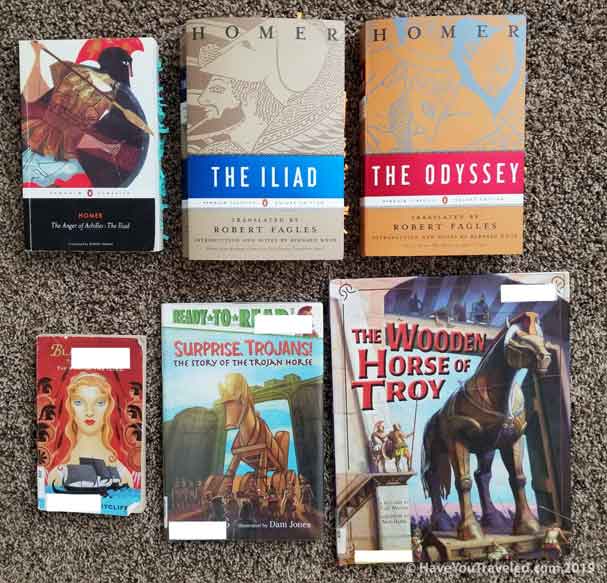Family learning is one of the most important Travel Principles in our family. After family and friends, learning is a top priority for us. And when traveling it’s one of the most enjoyable parts of the trip.
To set realistic expectations, don’t think for a second that we all have the same interests and levels of motivation in our travel-related learning. Our kids are 6 and 4, so even beyond their personal interests, they are developmentally in very different places.
Here’s a recent example from our planning for Greece next year.
Dan (super Greece enthusiast)
- joined online book club to read Homer’s Iliad and Odyssey
- read multiple translations of former, about to re-read the latter
- took notes on characters from Crete (like the great king Idomeneus)
Betsy (Greece enthusiast)
- interested in discussions about those books (role of women, nature of war, societal norms, etc.) but without reading them herself (yet!)
- more likely to read modern takes on the same classic stories
- Song of Achilles and Silence of the Girls (both for Iliad)
- Circe (for Odyssey)
6 yr old son (Greece enthusiast)
- not quite ready for the violence, treatment of women, other themes of Iliad but…
- seen statue of Homer in Louvre
- interested in “the oldest story in the world”
- likes that original story was performed (“like Hamilton!”)
- loves the Trojan horse part of the story (not found in Iliad but that’s ok)
- dying to go to Turkey to see Troy
- has a poster of Greek mythology in hall outside of bedroom
4 yr old daughter (Greece enthusiast)
- also not ready for violence and other specific of Iliad
- interested in most things her brother is
- old stories
- being performed
- Trojan horse story
- hallway poster
- can find Greece on a world map, Crete too
- listens to Rick Steves podcast about food and culture of Greece

We are all engaging with “Greece” at different levels at different times. Dan will likely keep digging deep on Socrates-Plato-Aristotle but Betsy might move on to art or the culinary experience of Greece. And if you think Dan is all books all the time, he’s been researching Crete’s beaches like we were going to move there permanently (if only!).
The point is to find ways in which to share these interests together. When we take the kids through the Agora in Athens we might talk to them about its importance and they might recognize the name “Socrates” or “Plato” (most likely the latter “play-doh”) but probably only for a minute or two. Just to set the context and give them the opportunity to ask questions and have a family discussion. It won’t be some kind of script. Just an opportunity to share what we’ve learned with those we love while traveling together.
For those with big kids (10+) consider having them either teach the younger ones about what they’ve learned. This can be done on family walks or more formally over dinner or even with slideshows or other visual presentations.
13+ kids, as mentioned before, can be assigned topics, sights, or themes to be responsible for. (You might want to provide them with some choices to choose from to help if undecided.) History, sure. Art, of course. But don’t forget architecture, flora and fauna and other natural wonders, sports, food, music.
And if it’s something you’re comfortable with, the bigger kids can also create media playlists for the whole family. They are the curators, helping everyone learn about tapas, or WWII battles, or the Dolomites, or Raphael.
talk soon,
Dan & Betsy
